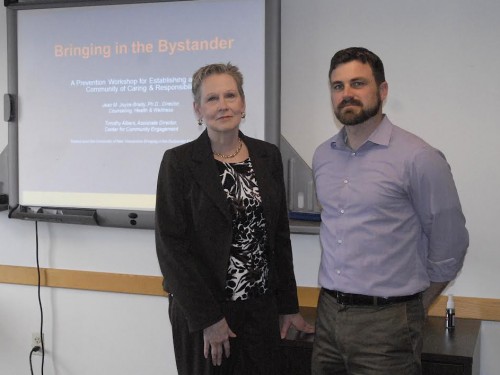Power in numbers can sometimes mean power in influence. But, when a room full of people assumes others will intervene in a sexual assault situation, no one guesses the victim could receive no help at all.
This social phenomenon, known as diffusion of responsibility, was discussed at the Sexual Assault Awareness Month Open Bystander Intervention Training event on Tuesday to raise awareness on how to be a positive bystander during a possible sexual assault.
Dr. Jean Joyce-Brady, director of and psychologist in the Counseling, Health, and Wellness Center, intentionally likes to focus on always de-escalating a potentially dangerous situation.

“I love listening to students talk about this because they always have a different take … Students are amazingly creative in using principles and de-escalating situations,” Joyce-Brady said. “Not doing it alone also brings a sense of confidence and safety in different ways.”
When students were asked the definition of a bystander, some responded by saying a bystander is a potential helper or observer to a situation. More often than not, Joyce-Brady said, it is rare that the image for a bystander is positive.
The exact definition Joyce-Brady gave for the term was, “Individuals who witness emergencies, criminal events or situations that could lead to criminal events and by their presence may have the opportunity to provide assistance, do nothing, or contribute to the negative behavior.”
Workshops like these for SAAM try to change the perception of what a bystander is, Joyce-Brady said, and make it more positive.
Timothy Albers, associate director at the Center for Community Engagement, discussed the ways in which a person can be a positive bystander by knowing how to successfully intervene.
“We want people to identify and understand what kind of personal barriers to acting as a bystander are and how can we overcome them,” Albers said.
When encountering a possible sexual assault, a bystander needs to think about the risks and dangers of the situation, what are available options, and asking others to help instead of diffusing responsibility, Joyce-Brady and Albers agreed on.
According to Albers, research has shown that calling on others to help as a bystander will prevent diffusion of responsibility, and will increase the likelihood of a positive outcome.
A video that was projected for the audience depicted a fictional scenario in which a sexual assault occurred, followed by how it could have been prevented by bystanders.
“There were a lot of different ways where people could have intervened … It can be something as simple as nodding to a friend and saying, ‘Hey, come over here,’ and that can really change the course of action,” Albers said.
The effects for victims of sexual assault or violence vary depending on context, Joyce-Brady said.
“The sexual act in intimacy is one of the most important, loving, caring things in a person’s life, but when that happens in a context of violence, then the same act is very confusing,” she said.
Typically, Albers said, sexual assault is heard of between males and females, but it is crucial to understand that it occurs within all communities and populations. The burden of reporting sexual assaults in the LGBTQ community is increasing, because there are other factors at play.
What could prevent this community from reporting an assault could be “in terms of feeling safe, and coming out and actually disclosing gender orientation,” he said.
The message for bystanders is when recognizing a sexual assault situation, do not assume someone other than yourself will be the bystander. With no intervention, situations are more often to repeat themselves, and could have a worse outcome than the last.








